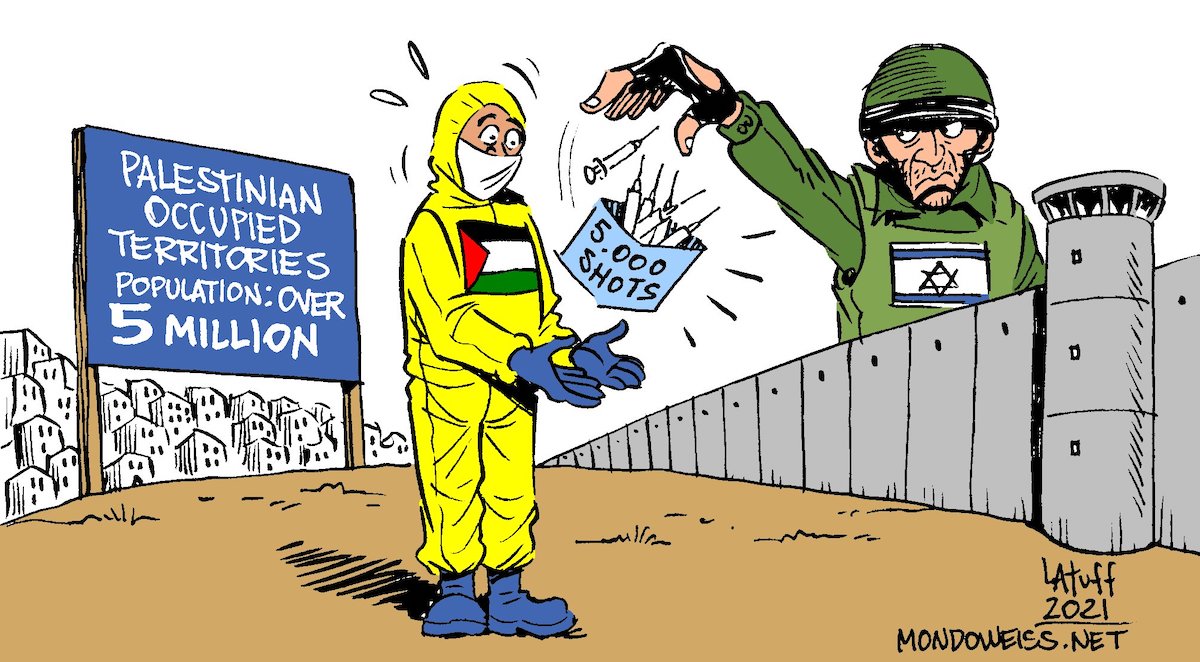
A few hundred Palestinians in the occupied West Bank were the lucky recipients of the COVID-19 vaccine last week, making them some of the first Palestinians in the West Bank to get the coveted vaccine.
After months of failed attempts to secure the vaccine and missed deadlines, the Palestinian Ministry of Health (MOH) received 2,000 vaccine doses of the 5,000 doses pledged by Israel to the Palestinian Authority (PA).
The doses were administered to Palestinian health care workers who are battling on the front lines against the coronavirus, which continues to spread across the occupied Palestinian territory (oPt), claiming more than 2,000 lives since March 2020.
Of the 2,000 doses received so far, Palestinian health officials in Gaza — which has a population of 2 million people — are reportedly waiting on some 300-500 doses to be sent their way, in order for them to start vaccinating medical professionals there, Anadolu Agency reported.
The PA is still waiting on the remaining 3,000 doses pledged to them by Israel, who despite being a world leader in its vaccination roll out, has refused to include the more than 5 million Palestinians living under Israeli occupation the West Bank and Gaza in its inoculation program, arguing that the PA should be responsible for vaccinating its citizens.
International human rights organizations have maintained that, despite Israeli protests, under international law the responsibility falls not on the PA, but on Israel as the occupier to provide essential healthcare, like COVID-19 vaccines, to the Palestinian population under its control.
With no further promises from Israel beyond the initial 5,000 vaccines it pledged, the PA has continued in its efforts to procure vaccine doses from a number of sources, including direct purchases and participation in the WHO’s COVAX program.
Just a few days after receiving the 2,000 doses from Israel, the PA received its first shipment of the Russian Sputnik V vaccine, with 10,000 doses arriving on February 4th. Minister of Health Mai al-Kaila said the doses would be distributed to 5,000 Palestinians, “primarily medical staff.”
Al-Kaila added that the MOH is anticipating the arrival of 50,000 more doses of the Sputnik V vaccine by the end of the month — though many Palestinians remain skeptical, due to a number of missed deadlines previously announced by the MOH.
Global speculation surrounding the Sputnik V vaccine were dashed earlier this week after peer-reviewed results published in The Lancet medical journal showed that the Russian vaccine protects against COVID-19 just as well as U.S. and European vaccines.
With more countries now lining up for the Russian vaccine, it could become increasingly difficult for the PA to secure more doses of the vaccine in the future.
For now the government is working with the COVAX initiative to supplement its purchases of the Russian vaccine, and is reportedly expecting 37,440 BioNtech-Pfizer vaccines to arrive in Palestine by the end of February through the program.
The PA has previously expressed concerns over its ability, or lack thereof, to store the Pfizer vaccine, which requires storage at subzero temperatures. The MOH said that they are expecting to receive another 240,000-400,000 doses of the AstraZeneca vaccine through COVAX by the end of February.
Assistant Health Minister Ali Abd-Rabu told Anadolu Agency that the government was aiming to vaccinate 20% of the population in the West Bank and Gaza through the COVAX program.
After months of waiting and watching Israeli citizens get vaccinated in the tens of thousands every day, the fact that a number of vaccines are beginning to arrive in Palestine, although at relatively minuscule rates, has come as somewhat a relief to Palestinians.
But the hope of getting vaccinated for the ordinary citizens still remains largely out of reach: altogether, an maximum of 500,000 vaccines could be arriving in Palestine by the end of the month — but that’s only enough to vaccinate a quarter of a million Palestinians, out of a population of more than 5 million people.
While the PA has said that priority will be given to medical personnel, the elderly, and chronically ill patients, government officials have still yet to make public any details of whatever roll out plans they may have, and how long, for example, it will take vaccines to arrive in the besieged Gaza Strip.
Information on how and where to get vaccinated and how to know if you may qualify for the vaccine still remain largely unknown to the public.
Meanwhile, the coronavirus continues to spread across the oPt, with over 1,000 new cases and 9 new deaths reported in the past 24 hours. There are currently 58 COVID-19 patients in intensive care, and 17 on ventilators.
Since March 2020, health officials have reported 184,999 cases of COVID-19. With the one year anniversary of the pandemic in Palestine fast approaching, and minuscule numbers of the population getting vaccinated, the COVID-19 situation in Palestine remains bleak, and will likely continue to grow in the coming months.
Related posts:
Views: 0
 RSS Feed
RSS Feed















 February 10th, 2021
February 10th, 2021  Awake Goy
Awake Goy  Posted in
Posted in  Tags:
Tags: 
















